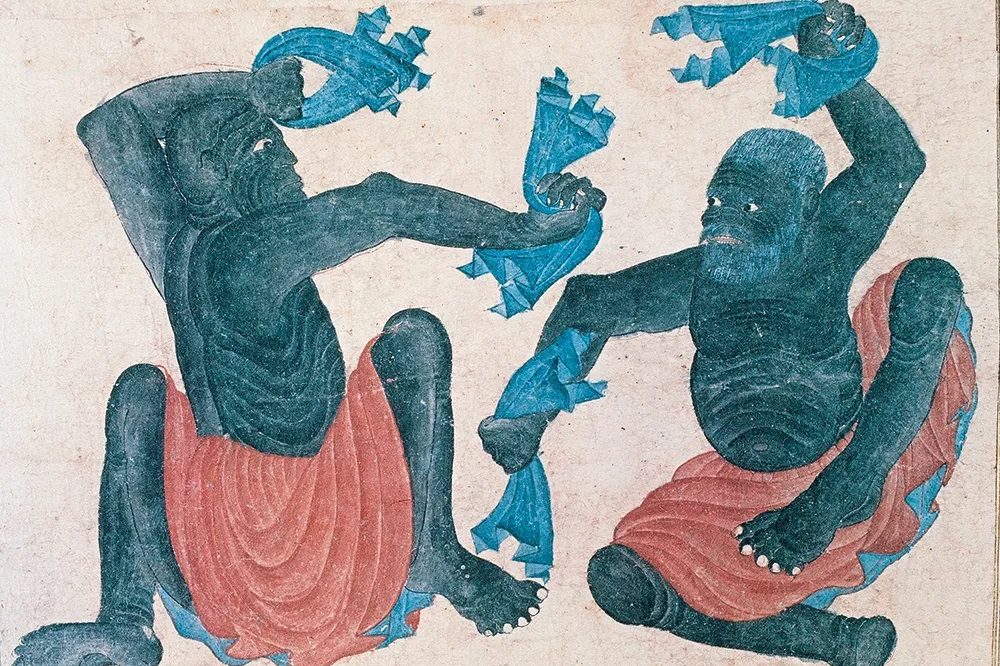Early in our marriage, my wife vetoed the idea of celebrating Christmas in the Alpine tradition: by having Santa Claus accompanied by Krampus, your friendly neighborhood ice-demon. Of course, Mrs. Davis was amenable to the idea of a horned monster beating our children with birch rods. At least when they’re naughty. Then she realized that, since neither of us are Swiss, it would technically be cultural appropriation. That was the end of that.
Speaking of demons, here’s a little Christmas meditation for you: more Americans believe in the Devil than in God. According to a recent survey, 56 percent of us believe that “Satan is not merely a symbol of evil but is a real spiritual being and influences human lives.” That’s compared to 51 percent who believe in an all-powerful Creator. Just 41 percent think Jesus was both fully God and fully man.
In other words, few of your neighbors actually buy the Christmas story — Emmanuel, “God with us,” etc. — but most are sold on the Devil.
Politicians and journalists are far more at ease talking about Satan than Jesus. Last October, Donald Trump was asked whether he believed that a cult of satanic pedophiles controls the Democratic Party. He pleaded the Fifth.
In fairness, he was in a tough spot. If he’d said yes, everyone would think he was potty. If he’d said no, he could have alienated the 24 percent of Republicans who are favorable to QAnon. So what can you do.
But it’s not just the Qsters who invoke the Big Man Downstairs. Just the other day, I re-read the transcript of Ann Coulter discussing Ghislaine Maxwell with Rebecca Mansour of Breitbart News. It included this fascinating exchange:
RM: Yeah, [Maxwell] was part of it. She was raping these girls too.
AC: These people are Satanic.
RM: Yeah. No, they are. They totally are.
AC: Totally.
Five years ago, this would’ve been a weird conversation. These days, it’s par for the course. What’s changed?
I’m sure it’s partly to do with the fact that Satan has become a folk hero among progressive youffs. For centuries, pious Mexican grandmas have been warning us that liberals were servants of the Devil. And we laughed. Now mainstream outlets like The Daily Beast and Teen Vogue publish glowing profiles of witches who used magic to help Joe Biden win the 2020 election.
Part of me thinks Democrats are just playing a big game of Gaslight the Rubes. Chip, a farmer from Amarillo, is sitting at the bar watching the news. It says actual Satanists are suing the state of Texas for the right to perform “abortion rituals.” He turns to his buddy Earl and asks, “What was it Preacher said about the Democrats sellin’ their souls to the Devil?” Suddenly they notice Hunter Biden, buck naked and tied to the pool table while Rachel Maddow stands over him dressed in a black robe, ready to plunge a dagger into his heart. “I can’t believe people actually believe those conspiracy theories!” she cries. “The GOP has lost its mind!”
Still, I think the main reason folks believe in Satan more than God is because the evidence is easier to come by. As Chesterton once said, original sin is “the only part of Christian theology which can really be proved.” And the proof is everywhere. It’s “a fact as practical as potatoes.” Quite right.
It’s easy — too easy — to find evil at work in the world. It’s much harder to find the good. Even the Bible talks about Satan putting his arm around Jesus, taking him up the mountain, and offering him all the kingdoms of the world. The Devil is garish.
In the first book of Kings, the Prophet Elijah also goes up a mountain, only he’s meeting God. Once he gets to the top, a strong wind nearly splits the mountain in half, but God isn’t in the wind. Then there’s an earthquake, but God isn’t in the earthquake. Then there’s a fire, but — if you can believe it — God isn’t in the fire, either.
“And after the fire a still small voice,” the Good Book says. And the small voice, of course, is God. God is like your car keys: you’ll find him where you least expect him. Once, a couple of Persian magicians found him sleeping in a trough somewhere in southern Palestine. That came as a bit of a shock, and the world never quite recovered. But he was just a baby back then.
I guess that’s as good a takeaway as any. Whatever religion you follow, or even if you follow no religion at all, read the Christmas story in the four Gospels. Read about Mary and Joseph almost splitting up, because Joseph couldn’t quite believe that Mary conceived a child while still a virgin. Read about their long journey to Bethlehem, and having to give birth in a barn, and laying their child in some nasty old straw. Read about the angels visiting the shepherds, singing, “Glory to God in the highest, and on earth peace to people of goodwill!” Read about the visit of the Magi from the far East, and about the Flight to Egypt, and the Massacre of the Innocents.
Why did everyone make such a fuss about this baby? Because someday he would grow up and say to the world, “A new commandment I give to you: that you love one another, even as I have loved you.”
It’s hard to hear those words over all the noise the world makes. (The Devil loves noise.) That’s why we sing, “Silent night, holy night…” every year for a month, starting on Thanksgiving. We’re reminding ourselves to be quiet. Then on December 25, we can hear the still small voice saying, “Love one another, even as I love you.” That’s why it’s easier to believe in God on Christmas.
Michael Warren Davis is author of The Reactionary Mind. Subscribe to his newsletter, “The Common Man.”

























